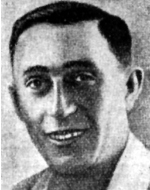Dinar, Shalom
He was born in 1911 in Kiev, Ukraine, and in 1919 his parents, refugees from the Ukrainian pogroms, brought him to the city of Zbaraz in eastern Galicia, where he completed an elementary school and as a talented student received a scholarship and continued to study at the Gymnasium Because of the need to help the family, he stopped his studies at the end of the fifth class and went to work in a barbershop in Tarnopol, where he continued to study Hebrew in evening classes of “Tarbut.” At the age of 12 he joined Hashomer Hatza’ir and the “White Paper” of Passfield, To Israel, increased the despair among Jewish youth in the Diaspora and pushed many into the arms of communism joined the pioneering movement “Busalia” WIZO In 1933 he immigrated to Israel and joined the “Busalia” group, whose members were in the Ramat Hasharon camp and worked as a hired laborer, and joined the Kiryat Anavim group for several years in the cowshed, specializing in this work, and then working as a driver in the group’s cars. During the Second World War he enlisted in the British Army and served there during the years 1946-1944 in Company 178 in the Italian, German, and Lowland Drivers’ Brigade. He did all he could to help She’erith Hapleitah, but his ability was very poor compared to his will. In his letters from there, he expressed his outrage at Britain’s betrayal of the Jewish people and its harshness in blocking the path of rescue and immigration before the refugees of the Holocaust. During the War of Independence he continued his dangerous service as a driver in bringing supplies to the group, in clashes with the gangs that harassed transportation, led by Palmach members to night raids, and with soldiers of engineering corps to break through checkpoints at Sha’ar Hagai. From Kiryat Gat to Katamon in Jerusalem On the night the group was shelled on May 29, 1948, he was killed by a bullet and taken to rest in the military cemetery in Kiryat Anavim. Pages in his memory were devoted to the book “On the Road, Kiryat Anavim in the Battle.”
